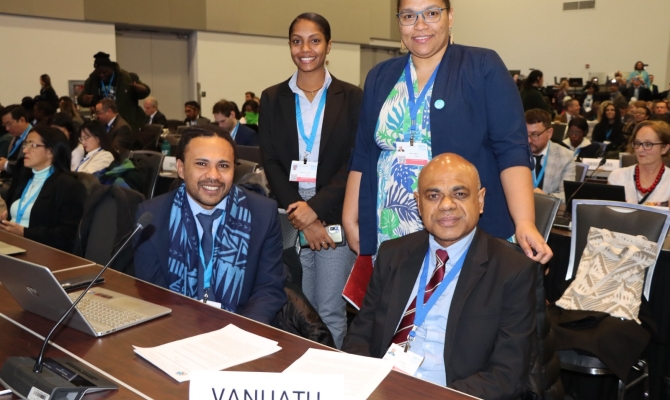
Vanuatu, speaking on behalf of the 14 Pacific Small Island Developing States (PSIDS), has made a call for the international community to work together in fulfilling its mandate to have an international legally binding instrument on plastic pollution by the end of the year.
Addressing the opening plenary at the fourth session of the Intergovernmental Negotiating Committee to develop an international legally binding instrument on plastic pollution, including in the marine environment (INC-4) at the Shaw Centre in Ottawa, Canada on Tuesday, the chair of PSIDS and Vanuatu’s Permanent Representative to the United Nations, His Excellency Odo Tevi said that time was running out and effective cooperation was critical in progressing the mandate.
“While we acknowledge the complexities of respecting the views of all states, the extensive and interconnected challenges posed by pollution to people and the planet demand urgent attention from the entire international community,” Ambassador Odo said.
“Our special circumstances as SIDS may make us different, but they do not take away our potential to partner as equals, collaboratively pursuing mutually beneficial outcomes for our countries, people, and the future we desire”.
Ambassador Tevi told the plenary that Pacific Island delegates travelled a great distance to participate in the negotiations, attesting to the importance of these talks for PSIDS and re-emphasizing the PSIDS commitment to, “ending plastic pollution and defending our beautiful island States from further environmental harm”.
Plastic waste has been found in all areas of the planet, from the deepest seas to the most remote uninhabited islands. It causes major harm to wildlife and ecosystems, disrupts the livelihood of millions of people, and poses significant risks to human health.
Currently, there are approximately 16,000 chemicals known to be used in plastics, yet only around 6% of these chemicals associated with plastics are regulated under existing multilateral environmental agreements, to which not all countries are party.
“The Stockholm Convention only covers Persistent Organic Pollutants (POPs) and takes several years to list new POPs meeting specific criteria. The Minamata Convention and Montreal Protocol solely address the chemicals used in plastic production, and the Basel Convention focuses on products, rather than chemicals or plastic polymers, only regulating the trade of plastic waste. So, at the global level, there is no binding instrument that regulates plastic polymers,” Ambassador Odo said.
This is why PSIDS is calling for reductions in primary plastic polymers and overproduction of plastic products, including the prevention of harmful chemicals from being used in the production of plastics and a criteria for sustainable design and traceability of chemicals.
“Criteria for sustainability must consider the full life cycle analysis of plastics, taking into account the potential impacts on the environment, economic, socio-economic cultural and human health impacts, including for food security as well as impacts in the marine environment,” Ambassador Odo said.
“We stress, however, that downstream measures will not be enough to tackle plastic pollution if we do not address plastics overproduction upstream,” the Ambassador added.
In March 2022, at the resumed fifth session of the United Nations Environment Assembly (UNEA-5.2) in Nairobi, 175 nations agreed to develop an international legally binding instrument on plastic pollution, including in the marine environment, by the end of 2024. The short timeline for negotiations was meant to match the urgency of the problem.
The INC is scheduled to complete its work in five sessions before the end of 2024. It has met three times in the last two years: November 2022 in Uruguay, May 2023 in France, and November 2023 in Kenya.
The fourth Intergovernmental Negotiating Committee to develop an international legally binding instrument on plastic pollution, including in the marine environment is taking place in Ottawa, Canada, from 23-29 April 2024
The Pacific Islands are represented by the Cook Islands, Federated States of Micronesia, Fiji, Kiribati, Marshall Islands, Nauru, Niue, Palau, Papua New Guinea, Samoa, Solomon Islands, Tonga, Tuvalu and Vanuatu through the support of the Government of Australia and the United Nations.
They are supported by the Secretariat of the Pacific Regional Environment Programme (SPREP), working with partners the Pacific Islands Forum Secretariat (PIFS), Office of the Pacific Ocean Commissioner (OPOC), The Pacific Community (SPC), Forum Fisheries Agency (FFA), Environmental Investigation Agency (EIA), Centre for International Environmental Law (CIEL), University of Wollongong, WWF and Massey University.
For more information visit: https://www.unep.org/inc-plastic-pollution/session-4